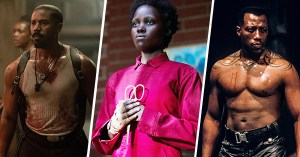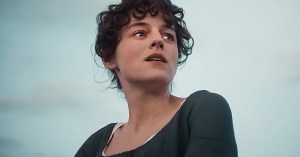Director Paul Haggis on In the Valley of Elah: The RT Interview
The Crash director lets us into the world of his latest.
 After a hugely successful TV career (he even created RT fave Due South) Paul Haggis struck the big time with his script for Million Dollar Baby, which went on to win four Oscars, including a statuette for the scribe himself, and firmly cemented his place on the Hollywood map. He followed up the triumph by writing and directing weepy race drama Crash – winning further Academy Awards in the process – and penning scripts for Clint Eastwood‘s
After a hugely successful TV career (he even created RT fave Due South) Paul Haggis struck the big time with his script for Million Dollar Baby, which went on to win four Oscars, including a statuette for the scribe himself, and firmly cemented his place on the Hollywood map. He followed up the triumph by writing and directing weepy race drama Crash – winning further Academy Awards in the process – and penning scripts for Clint Eastwood‘s
acclaimed war dramas Flags of Our Fathers and Letters From Iwo Jima.
The diminutive Canadian’s new film, which he wrote and directed, is the latest in a series of Hollywood efforts examining the U.S’s government’s apparently rather unpopular war in Iraq. In the Valley of Elah revolves around Tommy Lee Jones‘ Hank, a patriotic Texan who turns detective to investigate the disappearance of his son after he had completed a tour of duty in Iraq. RT caught up with Haggis for an exclusive chat, and asked about his feelings on the war, his relationship with Clint Eastwood, and, of course, writing the script for the Bond 22.
The story came from a Playboy article. What about that article appealed?
Paul Haggis:: Before that it started with articles and things I was seeing online; things that the troops were shooting in 2003/4 and posting. I found some of these images to be really disturbing. One was a rock video some kid who was over there had cut together. There were rockets flying by, buildings and tanks blowing up, and then there was a picture of one of these kids posing with a burnt corpse and goofing around with it. Then there was more rockets, more guns, more tanks rolling by, and then there was a body on the ground that was in pieces. One of these kids picked up the hand and waved it at the camera.
I thought: “Oh my God, what’s happening.” So I went looking for something and found Mark Boale’s story, it was sent to me by my agents. It was a story about a man who was searching for his son, who’d just come home from Iraq apparently and had gone missing. The father, in this case, was a former military police officer, so he starts his own investigation when the military seems uninterested in solving the mystery. And he eventually gets the help of a small town police detective, played by Charlize Theron, who again doesn’t seem very interested but is compelled to help. I wanted to tell the story not from my own point of view… I was demonstrating against this war way before and I thought no one would accept that point of view.
So, I figured: “Tell the story from a proud American, someone we could look at and say that we may not agree with his politics, or his life, but he’s a moral man, he knows right from wrong, and was a classic American hero. And let’s just follow him. This character has the same sin that I have, and that our nation has, and that’s a kind of pride. It’s the reason it’s one of the seven deadly sins, because excessive pride leads to blindness. So we start with a blind man who slowly opens his eyes and sees the truth and becomes destroyed by it.

As a father yourself, could you comprehend sending any of your children off to war?
PH: It would be the most difficult decision I’d ever have to make in my life. I don’t think I’m against all wars but you’d have to have a damn good reason to send your son or daughter to fight, or to go yourself. So often, we are lied to and manipulated by our governments for their own very cynical reasons. And that’s what’s happening in America – these very cynical people are manipulating young people and making them volunteer to serve in a place [like Iraq]. They go there thinking they can do something. Many of them joined up right after 9/11 and wanted to support their country – to be a hero. And we told these kids these stories, like the story of David and Goliath. We tell them these stories and they grow up wanting to be that.
But in places like Iraq, they land there and very quickly they realise that perhaps they are Goliath – perhaps they’re on the wrong side. They’re killing so many civilians and it haunts them. They come back and they’re often destroyed by what they’ve seen and what they’ve done. It’s why we have the highest suicide rate in the military in history. And we’re not even counting the suicides. We also have the highest rate of homelessness – these 22 and 23-year-old men come home and just disappear. They’re lost and they’re not getting the help they need. So I figured that if we couldn’t really truly empathise with the Iraqi people, perhaps we can empathise with our own men and women and see the story through their eyes – and then maybe through them see what we’re doing.
Do you think the American and UK public are yet ready for films about Iraq?
PH: I don’t know. You don’t make a film because the audience is ready for it. You make a film because you have questions that are in your gut. I put myself in the position of these men and I didn’t know what I would do. So, I knew I had to write this movie, I had to make this movie. A lot of filmmakers are doing the exact same thing right now. So, you make the movie and if the audience comes, it comes and if it doesn’t, then it doesn’t. But you have to make the movie and you have to tell the story.

How influential was Clint Eastwood in helping to get it made?
PH: Clint’s been a great friend. He’s the reason the film got made. I took it all around Hollywood for six or seven months and couldn’t get it sold, so then I took it to him. I asked him to read the story that Mark Boale wrote, which he did, and said: “Wow, is it true?” I said yes and he said he’d help get it done. So he took it to Warner Bros and asked them to consider it, which they did, and they bought the rights from me and I was able to write the screenplay. Then we had to cobble together the financing independently because it’s an independent film, and Warner Independent released it for us in the US.
The pacing is deliberately slow. Why was that?
PH: It’s a very pensive story but at the same time I wanted it to be a murder mystery. It’s about a man who’s very thoughtful and who doesn’t talk a lot. He’s just slowly, doggedly trying to get to the truth. I was trying to mirror him and his journey. I shot it like a classic American… almost a Western. If you look at John Ford’s movies, like The Searchers
, it’s very similar in tone and feel.
Tommy Lee Jones has a reputation for not suffering fools, so how was your experience of working with him?
PH: He was great. He’s not an easy man by any stretch, but I’m not an easy man, so we worked out great together [laughs]. If you get his respect and you keep it, then you’re fine. He just needs to feel safe, like any actor, and that they can experiment in order to give you what you need. He was marvellous – but so was Charlize, Susan, Jason and Josh.
Can you tell us anything about the next Bond film?
PH: Sure, no I can’t [laughs aloud].
But how does it feel to be a part of such a great franchise?
PH: Oh I love it. I love writing and participating in the screenplays. Barbara Broccoli and Michael Wilson are wonderful producers – they really know the franchise really well. And Martin Campbell, who directed Casino Royale, was great to work with and now we have Marc Forster, who’s a brilliant director, working on this one. So I really, really love digging into that character and asking some tough questions of him, who I so deeply admired and loved from when I was a kid. It’s great fun for me.

What do you think of the trend for war against terror movies?
PH: I’m very proud to be among them. I think a lot of filmmakers were asking the same questions back in 2003, because it takes three or four years to make a movie – to write it, produce it and get it out on screens. So, I’m terrifically proud to be part of those filmmakers.
How do you choose which projects you’re going to write and which projects you’re going to direct?
PH: Projects tend to choose me. I get some questions gnaw at me and I know I really want to make that movie – and I know I want to make it as a writer and a director, usually I want to see it through. It’s usually something that people wouldn’t make anyway! The ones I write are just because I love them. I’ll write anything for Clint Eastwood, for example. He’s a master filmmaker and I’m privileged to work with him. They’re all easy decisions on my part.
Is it true that Clint has retired from acting?
PH: You know that’s a good question. He told me that he wasn’t going to act anymore. But then he said: “Well, maybe that’s not true!” He might find something. But he said: “If I was going to go out there and say one film was my last film as an actor, then I don’t think I can do better than Million Dollar Baby,do you Paul?” It’s hard to argue with that. The thing with Clint is that he’ll always surprise you. That’s the marvellous thing about him. Whatever you think of him, you’re wrong. He’s just a man of contradictions and he loves surprising people.
You can’t imagine anyone other than Tommy Lee Jones playing the part once you’ve seen it. How much of his personality went into the role?
PH: To me, it’s not his personality so much as his acting ability. He just became this character so thoroughly. But that’s what a great actor does. You look at Crash with Matt Dillon, and Sandra Bullock and Don Cheadle – all these actors you can’t imagine anyone else playing the roles. That’s what happens when you get great actors.
There’s an incredibly poignant scene in the morgue after Susan Sarandon has been to see her son’s remains for the first time. Was that one of the scenes you had to add once she’d sent the script back to you the first time?

PH: Yes, yes. Susan’s character was… well, I knew she wasn’t going to do the movie because her character was so tiny [at first]. But you always try, so I sent it to her, she read it and said she’d love to work on the movie but there were just no real scenes there for her. So, I suggested: “What if this character came to see her son?” And I wrote that sequence on my laptop while I was driving around in the front seat of a scout van looking for locations and sent it back to her, she loved it and said that she wanted to do it. And thank God I added it because it’s one of the best scenes in the movie. She’s just brilliant in it.
What were your cinematic inspirations for this?
PH: I didn’t look at any other war films per se. I don’t like doing that. Stylistically, John Ford’s The Searchers – but Antonioni’s
Blowup was a big one for me. It was a big film that influenced me early on, so I went back and watched that.
How did you go about Roger Deakins as your director of cinematography – because he’s very much the man of the moment following the acclaim he’s been getting for Jesse James
PH: He’s a brilliant filmmaker isn’t he? I actually would have used James Muro, who I worked with on Crash, but he was off shooting something else. So I said: “Well, who would I love to work with? Who’s a great cinematographer?” Roger was the first person I thought of and so I tried him. I knew he would turn me down because he’s really busy and this was a small movie, but he said: “Ok, I’ll do it!” I said: “Really?” It seemed remarkable that he would sign on, so I added: “You know this is a small budget film?” And he said: “Yeah, yeah, we’ll figure it out…” But it was the same with the actors. They all did it out of passion, no one got their fee. But that’s what I love about working on films like this – people are doing it for the right reasons rather than for the pay cheque. It makes such a difference.






